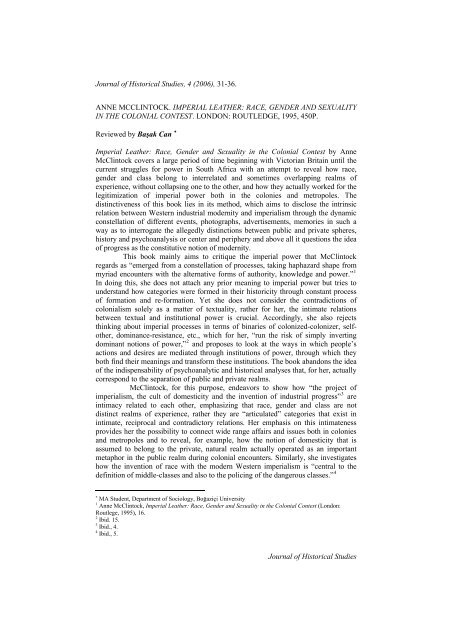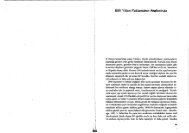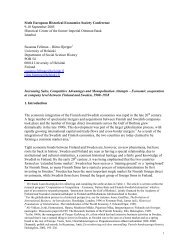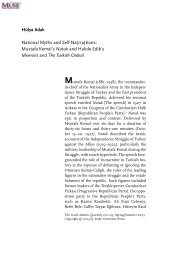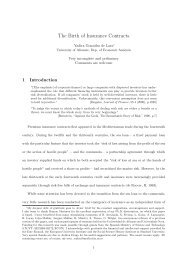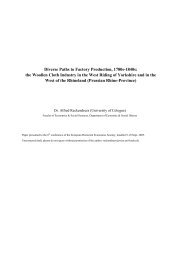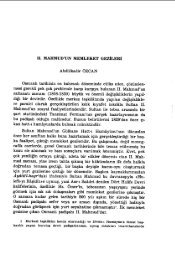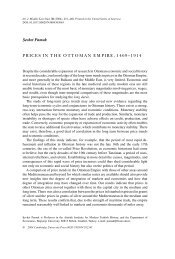Anne McClintock, Imperial Leather - The Ataturk Institute for Modern ...
Anne McClintock, Imperial Leather - The Ataturk Institute for Modern ...
Anne McClintock, Imperial Leather - The Ataturk Institute for Modern ...
You also want an ePaper? Increase the reach of your titles
YUMPU automatically turns print PDFs into web optimized ePapers that Google loves.
Journal of Historical Studies, 4 (2006), 31-36.<br />
ANNE MCCLINTOCK. IMPERIAL LEATHER: RACE, GENDER AND SEXUALITY<br />
IN THE COLONIAL CONTEST. LONDON: ROUTLEDGE, 1995, 450P.<br />
Reviewed by Başak Can ∗<br />
<strong>Imperial</strong> <strong>Leather</strong>: Race, Gender and Sexuality in the Colonial Contest by <strong>Anne</strong><br />
<strong>McClintock</strong> covers a large period of time beginning with Victorian Britain until the<br />
current struggles <strong>for</strong> power in South Africa with an attempt to reveal how race,<br />
gender and class belong to interrelated and sometimes overlapping realms of<br />
experience, without collapsing one to the other, and how they actually worked <strong>for</strong> the<br />
legitimization of imperial power both in the colonies and metropoles. <strong>The</strong><br />
distinctiveness of this book lies in its method, which aims to disclose the intrinsic<br />
relation between Western industrial modernity and imperialism through the dynamic<br />
constellation of different events, photographs, advertisements, memories in such a<br />
way as to interrogate the allegedly distinctions between public and private spheres,<br />
history and psychoanalysis or center and periphery and above all it questions the idea<br />
of progress as the constitutive notion of modernity.<br />
This book mainly aims to critique the imperial power that <strong>McClintock</strong><br />
regards as “emerged from a constellation of processes, taking haphazard shape from<br />
myriad encounters with the alternative <strong>for</strong>ms of authority, knowledge and power.” 1<br />
In doing this, she does not attach any prior meaning to imperial power but tries to<br />
understand how categories were <strong>for</strong>med in their historicity through constant process<br />
of <strong>for</strong>mation and re-<strong>for</strong>mation. Yet she does not consider the contradictions of<br />
colonialism solely as a matter of textuality, rather <strong>for</strong> her, the intimate relations<br />
between textual and institutional power is crucial. Accordingly, she also rejects<br />
thinking about imperial processes in terms of binaries of colonized-colonizer, selfother,<br />
dominance-resistance, etc., which <strong>for</strong> her, “run the risk of simply inverting<br />
dominant notions of power,” 2 and proposes to look at the ways in which people’s<br />
actions and desires are mediated through institutions of power, through which they<br />
both find their meanings and trans<strong>for</strong>m these institutions. <strong>The</strong> book abandons the idea<br />
of the indispensability of psychoanalytic and historical analyses that, <strong>for</strong> her, actually<br />
correspond to the separation of public and private realms.<br />
<strong>McClintock</strong>, <strong>for</strong> this purpose, endeavors to show how “the project of<br />
imperialism, the cult of domesticity and the invention of industrial progress” 3 are<br />
intimacy related to each other, emphasizing that race, gender and class are not<br />
distinct realms of experience, rather they are “articulated” categories that exist in<br />
intimate, reciprocal and contradictory relations. Her emphasis on this intimateness<br />
provides her the possibility to connect wide range affairs and issues both in colonies<br />
and metropoles and to reveal, <strong>for</strong> example, how the notion of domesticity that is<br />
assumed to belong to the private, natural realm actually operated as an important<br />
metaphor in the public realm during colonial encounters. Similarly, she investigates<br />
how the invention of race with the modern Western imperialism is “central to the<br />
definition of middle-classes and also to the policing of the dangerous classes.” 4<br />
∗<br />
MA Student, Department of Sociology, Boğaziçi University<br />
1<br />
<strong>Anne</strong> <strong>McClintock</strong>, <strong>Imperial</strong> <strong>Leather</strong>: Race, Gender and Sexuality in the Colonial Contest (London:<br />
Routlege, 1995), 16.<br />
2<br />
Ibid. 15.<br />
3<br />
Ibid., 4.<br />
4<br />
Ibid., 5.<br />
Journal of Historical Studies
Review of <strong>Imperial</strong> <strong>Leather</strong> 32<br />
During this analysis, <strong>McClintock</strong> simultaneously develops an<br />
understanding towards of in relation to time and space. This understanding is at the<br />
heart of her critique of the nineteenth century image of linear progress and its<br />
ramifications in today’s understanding of history. Her polemic with the term “postcolonialism”<br />
is also shaped with this critique of progress. She points out that despite<br />
post-colonialism’s critical approach towards the existing relations of power and its<br />
promise to re-center the history, the term itself inevitably connotes the separation of<br />
the colonial and post-colonial eras and tries to understand the variety of experiences<br />
in the past through one singular demarcation. 5 However, she questions the possibility<br />
of such a separation between colonial and post-colonial and argues that “imperialism<br />
emerged as a contradictory and ambiguous project, shaped as by tensions within<br />
metropolitan policy and conflicts within colonial administrations as by the various<br />
cultures and circumstances into which colonials intruded and the conflicting<br />
responses and resistances with which they were met.” 6 She also notes that this<br />
demarcation prevents us from detecting the tenacious legacies of imperialism and the<br />
accompanying notion of progress today.<br />
To develop this critique and detect the ramifications of the imperial <strong>for</strong>ms<br />
of power in today’s relations of power, she mainly focuses on the late nineteenth<br />
century, which, <strong>for</strong> her, is characterized by the transition from an industrialism based<br />
on imperial slavery to industrial imperialism based on wage labor 7 and a transition<br />
from the scientific racism to commodity racism, which can be observed in the<br />
specifically Victorian <strong>for</strong>ms of advertising and photography, the imperial Expositions<br />
and the museum movement. 8 For her, these transitions imply the conversion of the<br />
narrative of imperial progress into mass–produced consumer spectacle.<br />
Her elaboration on the mediation of the commodity fetishism through<br />
various spheres is especially important since she manages to reveal how domestic<br />
space was racialized and the middle class home became a space <strong>for</strong> the display of<br />
imperial spectacle and how the colonies –in particular in Africa- became a theater <strong>for</strong><br />
exhibiting the Victorian cult of domesticity and the reinvention of gender. In other<br />
words, she conceptualizes the notion of domesticity both as a space and a social<br />
relation to power and, through the analysis of soap advertisements, she shows how<br />
private domesticity –the realm that is situated outside the public one and<br />
characterized by the dominance of the male- and the imperial market converge in a<br />
single commodity spectacle. Domestication of the imperial market means wrestling<br />
animals, women and colonized people from their putatively “natural” state of<br />
“savagery” and replacing them into a hierarchical relation to white men through the<br />
domestic progress narrative. She there<strong>for</strong>e historically shows that the domestic is<br />
political and the political is gendered and argues that those notions overlap and<br />
intersect through the commodity fetishism during the process of imperial progress<br />
and capitalist civilization. 9 For this purpose, she reflects on the relations both within<br />
the metropoles and at the imperial level focusing on local events that bear the imprint<br />
of social hierarchies.<br />
<strong>McClintock</strong> successfully manages to show interpenetration of gender and<br />
power relations in the colonial situation in the section on the analysis of Arthur<br />
5 Ibid., 11.<br />
6 Ibid., 15.<br />
7 Ibid., 112.<br />
8 Ibid., 33.<br />
9 Ibid., 32.<br />
Journal of Historical Studies
33 Başak Can<br />
Munby/Hannah Cullwick affair. In this section she shows “how working class<br />
women, like the racialized ‘natives’ dotting the imperial landscape, become subject<br />
to, and object of a similar masculinist order of colonial logic.” 10 One of her emphases<br />
in this section is that the social hierarchies that arose with the imperial power cannot<br />
be understood just with reference to the relations between colonies and metropoles;<br />
rather the gendering of imperialism that took different shapes in different parts of the<br />
world in line with the dominance of commodity racism has to be revealed. Another<br />
section that principally focuses on the larger domestication of the market of empire<br />
aims at exposing how imperial advertisements <strong>for</strong> different brands of soap invoke<br />
images of monkies, or of an evolutionary racism, to sell not just commodities but a<br />
particular version of positivist history. Those two sections actually complement each<br />
other, disclosing how “female servants were racialized and portrayed as frames <strong>for</strong><br />
the exhibition of the commodity, in advertising scenes set in the colonies, African<br />
men are feminized and portrayed as exhibition frames of commodity display.” 11 She<br />
makes these historical observations making use of two tropes, anachronistic space<br />
and panoptical time, which are intimately related with her critique of progress.<br />
<strong>The</strong> analysis of gendering dynamics of imperial power through the<br />
interrogation into the implications of those tropes will help her understand<br />
contradictory and constitutive relations between universal bourgeois projects and<br />
their material effects at the everyday level experiences in local circumstances. For<br />
Cooper, the new colonial era of the nineteenth century is characterized by the<br />
emergence of universal claims of bourgeoisie in all spheres of life as the pioneer of<br />
progress and development; however, this also came along with the questions as to the<br />
universality of the idea of citizenship, especially in the cases of colonial encounters. 12<br />
<strong>The</strong> colonies there<strong>for</strong>e turned into spaces through which the inherent contradictions<br />
of bourgeois order were revealed and <strong>McClintock</strong> illustrates how the inclusion and<br />
exclusion mechanisms are similar in many ways in colonies and metropoles, focusing<br />
on different local, cultural and public spaces through which the bourgeois order was<br />
put into effect by maintaining cultural differences as inherent features and defining<br />
moral superiority of itself. She makes use of the notions of “anachronistic space” and<br />
“panoptical time” there<strong>for</strong>e to denote the ways in which cultural differences are<br />
reified and served to naturalize the idea of progress. Through the <strong>for</strong>mer, she notes,<br />
“Geographical differences across space is figured as a historical difference across<br />
time.” 13 She elucidates the notion of anachronistic space as follows: “Colonized<br />
people –like women and working class in the metropolis- do not inhabit history<br />
proper but exist in a permanently anterior time within the geographic space of the<br />
modern empire as anachronistic humans, atavistic, irrational, bereft of human<br />
agency.” 14 All cultural, racial etc., differences across space are projected onto the<br />
historical time in which the European bourgeoisie represents the idea of economic<br />
and social progress and there<strong>for</strong>e all marginal groups, such as women, colonized<br />
people or the working class, are deprived of historical agency. On the other hand,<br />
panoptical time refers to images of global history, consumed at a glance in a single<br />
10<br />
Available at http://www.infomotions.com/serials/pmc/pmc-v6n3-arondekar-problem.txt.<br />
11<br />
<strong>McClintock</strong>, <strong>Imperial</strong> <strong>Leather</strong>: Race, Gender and Sexuality in the Colonial Contest, 225.<br />
12<br />
Frederick Cooper and Ann Laura Stoler, “Between Metropole and Colony: Rethinking a Research<br />
Agenda”, in Tensions of Empire: Colonial Cultures in a Bourgeois World, ed. Frederick Cooper and Ann<br />
Laura Stoler (Berkeley: University of Cali<strong>for</strong>nia Press, 1997), 2-3.<br />
13<br />
<strong>McClintock</strong>, <strong>Imperial</strong> <strong>Leather</strong>: Race, Gender and Sexuality in the Colonial Contest, 40.<br />
14<br />
Ibid., 30.
Review of <strong>Imperial</strong> <strong>Leather</strong> 34<br />
spectacle from a point of privileged invisibility. For example, at the world exhibitions<br />
visitors could travel backwards in time by walking from the modern machinery hall<br />
to Java and Senegal (anachronistic space), watching “authentic” African artisans and<br />
Javanese dancers – sometimes behind fences – as a point of privileged invisibility<br />
(panoptical time). Those notions were crucial <strong>for</strong> the self-definition of the middle<br />
class as the representatives of putatively inevitable historical progress. <strong>The</strong> marginal<br />
groups are replaced outside of the history in the sense that bourgeoisie can see them<br />
without being seen, and they represent an archaic, pre-modern time that can be<br />
detected in the present.<br />
<strong>The</strong>se concepts point out the underlying epistemological and ontological<br />
aspects of imperial power that name, define or label different groups of people in<br />
such a way as to intervene or regulate their lives according to prevailing norms of<br />
bourgeois order, primarily the commodity production and the ideal of progress.<br />
Those concepts reveal how the unevenness among people, cultures, classes are<br />
naturalized and the existing order was maintained or perpetuated or how new kinds of<br />
contradictions emerged in different colonial settings. Yet this never meant that<br />
colonial states managed the contradictions very well. For <strong>McClintock</strong> one of the<br />
problems of post-colonial literature lies in its approach towards the global history that<br />
in spite of its critical distance to the existing <strong>for</strong>ms of power, it leaves aside imperial<br />
and anti-imperial narratives, discourses and practices that constitute a complex legacy<br />
that we are still living through. Her endeavor to get rid of the idea of progress in the<br />
understanding of history mainly is inspired by Walter Benjamin.<br />
Benjamin is also interested in the nineteenth century, especially the<br />
phantasmagorias such as arcades, boulevards, world exposition etc., that indicates the<br />
dominance of commodity fetishism, the ideal of progress and bourgeois order in all<br />
spheres of life, but it also embraces the sparks of hope that transgressed this<br />
dominance. 15 He approaches history not to “reveal how it really was,” but to grasp<br />
and portray those sparks of hope through the constellation of images in such a way as<br />
to intervene in the present to explode the image of infinite progress in history. What<br />
Benjamin’s emphasis on the inconsistency between the relations of production and<br />
development of technology and means of production aims to show is that the idea of<br />
historical progress also corresponds to the constant repetition of production of<br />
exchange relations and social inequalities. <strong>The</strong>n the contrast between the notion of<br />
anachronistic space that serves to legitimize the bourgeois order and Benjamin’s<br />
understanding of history that excavates <strong>for</strong>gotten and marginalized episodes from the<br />
past and repositions them dialectically with the present becomes clear. While the<br />
<strong>for</strong>mer throws the differences of colonized, women or working class out of history to<br />
perpetuate the imperial idea of progress in the present both in metropoles and<br />
colonies, the latter, by imagining the past in our space, enables one to “recognize the<br />
monuments of the bourgeoisie as ruins even be<strong>for</strong>e they have crumbled” 16 and to<br />
subvert hegemonic representations of history as the unfolding of the idea of progress<br />
or progression. This latter also characterizes the main attempt of <strong>Imperial</strong> <strong>Leather</strong>.<br />
For <strong>McClintock</strong>, “the idea of progress that illuminated the nineteenth century was<br />
shadowed by its somber side.” 17 And actually she contends that the idea of<br />
15 Walter Benjamin, “Paris, Capital of the Nineteenth Century (Expose of 1935)”, in <strong>The</strong> Arcades Project,<br />
ed. Rolf Tiedemann (<strong>The</strong> Belknap Press of Harvard University Press, 1999), 13-22.<br />
16 Ibid., p.13.<br />
17 <strong>McClintock</strong>, <strong>Leather</strong>: Race, Gender and Sexuality in the Colonial Contest, 118.<br />
Journal of Historical Studies
35 Başak Can<br />
degeneration is crucial to the idea of progress and similarly, departures from the<br />
normal human types are necessary to the self-definition of the middle-class.<br />
She argues that as long as there are strong continuities between the colonial<br />
era and the current situation in the way practices and discourses are produced, there is<br />
a need to deal with the manners in which gender, race and class interacted with each<br />
other both in complementary and contradictory ways in the colonial encounters. <strong>The</strong><br />
analysis of colonial contest taken as a system <strong>for</strong> the exercise of power has strong<br />
ramifications <strong>for</strong> today and, as noted by Cooper, “they are fundamental to any history<br />
of the present.” 18 To elucidate her approach on the relation between the colonial<br />
situations of the past and the current situation, I will focus on the last section of her<br />
book in which <strong>McClintock</strong> deploys Benjamin’s notion of evocation of archaic images<br />
in modernity to investigate the relation between the nations and domestic genealogies<br />
in the context of de-colonization and nationalization process. One of her premises is<br />
that nations are historical practices through which social difference is both invented<br />
and per<strong>for</strong>med, and accordingly she argues that the processes of constitution of<br />
nationalism is frequently violent and always gendered ones. 19 In this section she first<br />
illustrates how the social subordination of women and children within the domestic<br />
sphere was naturalized while women also were constructed as the symbolic bearers<br />
of the nation, but without having an historical and national agency. Following<br />
Benjamin’s understanding of modernity, she reveals how “uneven gendering of<br />
national citizenship” 20 both trans<strong>for</strong>med traditional attachments in favor of new<br />
identities and selected some “authentic” cultural values such as family to legitimize<br />
the subordination of women. According to <strong>McClintock</strong>, women became both<br />
representatives of the inert, atavistic body of national tradition, embodying<br />
nationalism’s conservative principle of continuity. Men by contrast represented the<br />
progressive agent of national modernity, embodying nationalism’s progressive<br />
principle of discontinuity. 21 Even though it is possible to argue against such a strict<br />
demarcation between men and women in terms of the roles attached to them during<br />
the <strong>for</strong>mation of nations, she also stresses the differences between different groups of<br />
men and women and acknowledges that nationalisms do not follow a universal<br />
blueprint. In this section, she also develops a critique of Fanon’s analysis as to the<br />
gendering of the national <strong>for</strong>mation according to which colonialism aims at the<br />
domestication of colony so as to divert female power into colonial hands and disrupt<br />
the patriarchal power of colonized men. <strong>The</strong>re<strong>for</strong>e the agency of women is only a<br />
designated one in the sense that the stereotype of women was portrayed as bereft of<br />
historical motivation. 22 For her, similar to colonial discourses, in Fanon’s<br />
understanding, women have no history and women enter into the history only with<br />
oppression and opposition. <strong>McClintock</strong> critiques Fanon <strong>for</strong> granting only a<br />
designated agency to women; in other words, “agency by invitation only.” 23 This<br />
critique is in line with her previous warnings as to the ideal of progress that operated<br />
by rendering spatial into temporal difference, which deprives peripheral groups of<br />
historical agency.<br />
18<br />
Frederick Cooper, “Decolonizing Situations: <strong>The</strong> Rise, Fall and Rise of Colonial Studies, 1952-2001,”<br />
French Politics, Culture and Society, (2002): 2.<br />
19<br />
<strong>McClintock</strong>, <strong>Leather</strong>: Race, Gender and Sexuality in the Colonial Contest, 353.<br />
20<br />
Ibid., 359.<br />
21<br />
Ibid., 359.<br />
22<br />
Ibid., 366.<br />
23<br />
Ibid., 365.
Review of <strong>Imperial</strong> <strong>Leather</strong> 36<br />
As noted by Cooper, in spite of the instability of the otherness of peripheral<br />
groups, we can detect “similar attitudes and policies of a metropolitan ruling class<br />
towards lower classes, local speech and regional social practices in Europe were<br />
comparable to attitudes and policies toward colonial power.” 24 <strong>The</strong>re<strong>for</strong>e we can<br />
make use of <strong>McClintock</strong>’s insight to understand the existing power relations within<br />
the borders of nation states, since she notes that imperial and anti-imperial narratives<br />
and discourses constitute a complex legacy that we are still living through, and that<br />
much contemporary work in cultural analysis and theory is historically <strong>for</strong>estalled.<br />
Her emphasis on the continuity between imperial <strong>for</strong>ms of power and modern nationstates<br />
is especially crucial when we began to consider the legacy of imperial tropes -<br />
mainly the anachronistic space and panoptical time- in nation-states’ struggle against<br />
all kinds of differences within their borders.<br />
24 Cooper and Stoler, “Between Metropole and Colony: Rethinking a Research Agenda”, 2-3.<br />
Journal of Historical Studies


